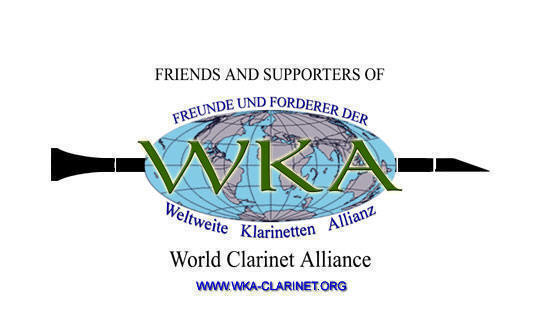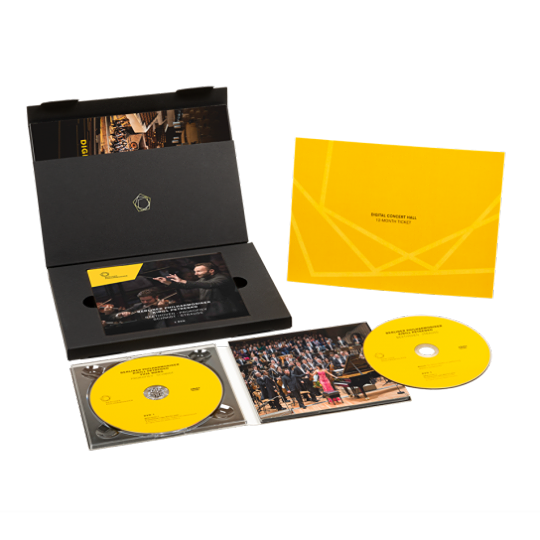
Click over Logo to Home Page
December 2018 Hot News
25 December 2018
Christmas Greet from VIP Wenzel Fuchs to Mike Getzin
https://www.facebook.com/268919533122783/videos/2193374734248222/
22 December 2018



Happy Holidays from the Berliner Philharmoniker and the West Point Band
Berliner Philharmoniker Christmas Offer with Tickets and DVD Double Set - and Offer description
Christmas greetings from VIP Sarah Willis and a Flute Ensemble - Sarah Willis Hosting
|
|
|
|
|
West Point Band Woodwind Ensemble
VIP Matt Vance discussing Buffet Instruments
18 - 22 December 2018
MidWest Band & Orchestra Clinic
Chicago, Illinois USA
What began in 1946 as 120 music directors meeting for six hours in a Chicago YWCA gym has now become the annual four-day music band and orchestra conference known as The Midwest Clinic International Band, Orchestra and Music Conference. For over 70 years, musicians, educators and people passionate about music education of all skill levels have gathered in Chicago for the largest music conference of its kind.
The Midwest Clinic International Band, Orchestra and Music Conference offers
guests interested in music education an array of clinics and exhibits, as well
as access to music and teaching icons. The conference will also focus on
industry trends and future topics in business and music education. With more
than
17,000 attendees from all 50 states and more than 30 countries, The
Midwest Clinic offers music educators and musicians alike an
unmatched networking opportunity.
The Midwest Clinic is ideal for:
The Midwest Clinic seeks to help musicians of all skill levels and stages advance
into the next level of their careers.
VIP Radovan Cavallin performs Christmas Concert at the Spectacular Varazdin arena performing Ante Grgin Clarinet Concerto with Ministry of Defense Symphonic Wind Band of Croatia and with Conductor Miroslav Vukovojac-Dugan in Beautiful Zagreb Concert Hall “Vatroslav Lisinski”
19 - 21 December 2018
2nd Festival de Clarinetes - Amalia Del Guidice, Soloist
San Martin de los Andes, Argentina
Beautiful last day of the II Festival of clarinet a of San Martin De Los Andes. Thank you for the warmth, the great effort to make this festival a party of clarinets, music and friendship! Thank you Amelia Saftich Clarinetista, Marta Cáceres, Sebastian Drach for being in everything in every moment! A hug to the participants and to Boris Eduardo Silva Barrientos and their students who came from Puerto Varas, Chile!! Huge kisses. Very Merry Christmas and new year!!
16 December 2018
VIP and Acclaimed Soloist and Chamber Music Artist Professor at the Peabody Conservatory in Baltimore, Maryland Alexander Fiterstein performs Mozart Clarinet Quintet with the New World Chamber Ensemble
Miami, Florida USA
Three contrasted works by 20th- and 21st-century composers
and a late Mozart masterpiece comprised the typically enterprising menu for the
New World Symphony’s chamber music program Sunday afternoon at the New World
Center.
One significant aspect of the concert was technological. Each of the musicians
were playing their scores from iPads placed on their music stands rather than
trational print editions. While some soloists (notably Jeremy Denk) have
utilized this device for their performances, New World is pushing the envelope
for ensemble performances and the young players seemed to have adapted nimbly to
the new mode.
John Harbison has long been one of America’s most significant composers, with
symphonies and vocal scores that stand as important contributions to the concert
repertoire.
Harbison’s Music for Eighteen Winds
(1985) has much in common with Stravinsky’s Symphonies of
Wind Instruments. Like that wind ensemble creation,
Harbison’s eleven-minute work flows in astringent, neo-classical sonorities.
Following an opening section replete with terse overlapping episodes, a chorale
for four horns leads to a lengthy alto saxophone solo, suggesting jazz and the
blues.
Concise and brilliantly conceived, the score displays Harbison at his inventive
best and the New World players gave it a performance that bristled with momentum
and forward drive. Dean Whiteside (the only artist of the afternoon woing from a
printed score) conducted the ensemble with rhythmic snap. The rich, vibrant tone
of Jeffrey Siegfried’s saxophone and the strength and solidity of the horn
quartet (Roy Femenella, Priscilla Rinehart, Corbin Castro and Dominic Brancazio)
were outstanding.
Bulgarian-born Dobrinka Tabakova’s Such Different Paths
(2007-08) was the afternoon’s discovery. Scored for string septet, Yabakova’s
riveting eighteen-minute score melds repetitive minimalism and folk influences
with the ancient sound of a viol consort, and the spiritual raptness of Arvo
Pärt and Henryk Górecki. The music alternates rapid episodes with more
reflective and contemplative sections. At times, the musicians play the same
figurations out of sync, yet Tabakova’s sonic landscape is entrancing and
beautiful. Cellists Blake-Anthony Johnson and James Churchill carried the
score’s darker, more soulful moments with fine ensemble contributions by
violinists Jonathan Chern and Brendon Elliot, violists Spencer Ingersol and Yuan
Qi, and bass Douglas Aliano.
The music of Paul Schoenfield incorporates Judaic traditions into a classical
context. His 1986 Trio for clarinet, violin and piano was written to be played
both as a concert work and as entertainment at Hassidic festivals. “Freylakh,”
the trio’s opening movement, moves a klezmer-tinged dance theme through the
pessimistic harmonic prism of Shostakovich. A sardonic march in the manner of
Prokofiev is followed by the prayerful “Nigun.” A fast, foot-stomping
finale “Kozatzke” concludes a score that radiates joy and hope amid dark
musical clouds.
Anthony Quail’s clarinet had the tangy klezmer wail and agility for the
rapid dance sections but also depth of tone for the solemn prayer. The wide
vibrato and bold strokes of Harry Chang’s violin suggested the fluidity of a
jazz or folk band player. Thomas Steigerwald negotiated the hand crossings and
speedy riffs of the piano line adroitly.
Alexander Fiterstein was the featured guest artist in Mozart’s
Quintet in A Major for clarinet and strings. Last March, Fiterstein gave an
outstanding performance of the same work with the
superb Dover Quartet for the Friends of Chamber Music, and appeared here with
the
Russian String Orchestra just last month.
Fiterstein is one of the finest solo clarinetists on the concert stage today.
His trademark mellow tone and smoothly coordinated leaps between the
instrument’s registers were on full display. He actually played the score with
greater agility and grace this time around.
The problem was that his New World colleagues were not in his league and the
performance took two movements to get off the ground. The slower tempo for the
initial Allegro effectively underscored the sadness beneath Mozart’s
aristocratic instrumental lines but Kenneth Liao’s scrawny violin tone proved an
uneven match for their guest clarinetist. Violinist Yada Lee and cellist Ian
Greenberg were just marginally better. Only violist Kip Riecken produced a sound
that matched that of Fiterstein.
The performance belatedly took off with a spirited reading of the Menuetto with
Fiterstein bringing some indigenous dance strokes to his phrasing and the
strings providing greater strength and thrust. There was a lithe bounce in
the strings for the delightful Allegretto con variazioni finale. Fiterstein’s
mastery was front and center in the whirling figures of the first variation. The
first two movements could have used more of the level of ensemble cohesion
manifesting the finale.
The New
World Symphony’s chamber music series continues with Haydn’s String Quartet in D
minor, Hindemith’s Octet and Schumann’s Piano Quintet 2 p.m. January 20, 2019.
nws.edu; 305-
Three contrasted works by 20th- and 21st-century composers and
a late Mozart masterpiece comprised the typically enterprising menu for the New
World Symphony’s chamber music program Sunday afternoon at the New World Center.
10 December 2018
Chicago Clarinet Ensemble Benefit Concert for Ralph Wilder, eminent Clarinet Teacher and Band Director who suffered lower body paralysis
Chicago, Illinois USA
From VIP Rose Sperrazza - Professor of Clarinet at Northeast Illinois University
Many young clarinetists were inspired by this trio last night at Chicago Clarinet Ensemble's Benefit Concert for Ralph Wilder. Their willingness to be part of a clarinetist community in Chicago, and to be such open, positive, and accessible artists and role models has directly benefited more young clarinetists than I can count. Thank you.
with Stephen Williamson, Charlene Zimmerman and John Yeh.
WGN9 Broadcast of the Concert preparation
CHICAGO — A local musician who was paralyzed in an accident, returned to the stage for a fundraiser in his honor Monday evening at Northeastern Illinois University.
Ralph Wilder is a musician, music teacher and band leader. On May 6, 2017, while he was sitting down for a practice in a room right around the corner from the concert hall, a huge projection screen fell from the ceiling and pinned him to the floor.
“And I saw pools of blood and I realized they were coming from me,” he said. “And then I don’t remember much of anything after that.”
He was paralyzed from the chest down and had learn how to play his clarinet with half his former lung capacity.
“You can take his physical abilities away from him. You can’t take the maestro that he is away from him,” Jeff Wilder, his son, said.
On Monday, Wilder took the stage, bursting with pride, at a fundraiser in his honor, accompanied by his grandson and his daughter.
“When we all get out of bed in the morning and we might have our aches and pains, our daily stresses. I think he put things into perspective of really what you should be grateful for,” Debby Wilder, his daughter, said.
They see him as their inspiration. But Wilder said he’s the lucky one, because he can still play. He said music saved his life.
“Obviously, sometimes the reality of what I used to do and can’t do anymore raises its ugly head, but at the same time, I’m trying to do the best I can,” he said.
It was a night of exception music, and some of the finest artists in the city, including members of the Lyric Opera and the Chicago Symphony Orchestra, came to support one of their own. Wayne Mesmer of the Chicago Cubs was also in attendance to support Wilder.
“It is almost overwhelming to realize that this evening of incredible players has been put together on my behalf. It’s almost unbelievable,” Wilder said.
Wilder motto, is, “Do the best you can with what you have, and don’t worry about what you don’t.”
To donate money to the Wilder family fundraiser, visit their GoFundMe page.
10 December 2018
VIP Alexander Fiterstein (Professor at the Peabody Conservatory in Baltimore, Maryland) Master Class at the Buffet New York Showroom
New York City USA
7 December 2018
VIPs Charles Neidich and Ayako Oshima Washington Series Concert 'Intellect and Excitement' at the Tenri Center
New York City USA
Only the superb artistry of Charles Neidich and his team of great collaborators could make an entire evening of Milton Babbitt and Charles Wuorinen as engaging as it was on Friday night, December 7, 2018, at the Tenri Cultural Institute.
At the end of the Second World War, much of Europe lay in ruins, with unspeakable horrors still being brought to light and costly reconstruction needed everywhere. In 1946, as a manifestation of the continuation of art, a contemporary music festival was founded in Darmstadt, Germany, where it continues to this day. It was renowned for its adherence to uncompromising twelve-tone and serial compositional techniques. It was there that Pierre Boulez made his famous statement (paraphrased here) that “any music that is not serial in nature is worthless.” Unfortunately, many great composers who still believed in arching, yearning lines were either ridiculed, minimized, or completely ignored (until about 35 years ago). Many of the serial composers, comfortably ensconced in academia, consciously turned their backs on the listening public and composed for each other, so to speak. One might argue that the old-fashioned sense of beauty was seen as irrelevant after an age that saw nuclear destruction and the Holocaust.
Milton Babbitt, who lectured at Darmstadt, was one of those intellectually rigorous composers. The disjunct lines, organization of the pitches that are used in any given work, conscious manipulation of rhythms and dynamics according to a plan, lack of any identifiable tonal center, are all hallmarks of the style. For this reviewer, settings of poetry in this idiom are not conducive to text comprehension, but watch out New York, there’s a “new Lucy” in town. Lucy Fitz Gibbon was the excellent soprano on this occasion, beginning with Babbitt’s Quatrains (1993, words by John Hollander). She handled the challenging writing with ease. It is best to listen to the whole combination of sonority to get the emotional expression, rather than any specific text painting. The husband/wife team of clarinetists Charles Neidich and Ayako Oshima blended so well that at time it was difficult to distinguish whether a clarinet was playing or the singer was singing.
Then followed Charles Wuorinen’s Cello Variations II (1975) for solo cello, with veteran Fred Sherry doing the honors brilliantly, from memory. Mr. Wuorinen was in attendance, and he could only have been happy with all the presentations this evening, honoring his eightieth birthday year. Every bit as intellectual as Babbitt, I do notice a slightly warmer tone to much of his music, and a strong sense of pulse that guides the listener through.
Babbitt’s Quintet for clarinet and string quartet (1996) closed the first half with Mr. Neidich at the helm and the fine string quartet players: Katie Hyun and Yezu Elizabeth Woo on violin, En-Chi Cheng on viola, and Fred Sherry again on cello. I’ve always thought this a worthy companion piece to the ubiquitous Brahms quintet; one could program it first, so no one would leave, then play the Brahms as a sort of “consoling” voice, if the Babbitt was perceived as too rigorous.
After intermission, and the customary fine food and beverages that are served, Babbitt returned with My Ends Are My Beginnings (1978), a pun on the medieval motet by Guillaume de Machaut Mon fin est mon commencement, which is a rigorous crab canon. In that age, composers reveled in filling their scores with all manner of learned devices that would only be appreciable to those in the know (sound familiar?). Mr. Neidich played both clarinet and bass clarinet, and was genially unflappable despite a reed mishap early on.
ThenMs. Fitz Gibbon returned with her regular recital partner Ryan McCullough for Wuorinen’s A Song to the Lute in Musicke (1970, text attributed to pre-Elizabethan poet Richard Edwards). The duo is splendidly matched, and Mr. McCullough’s piano handling of the disparate lines is extremely sensitive. They continued with Babbitt’s Du (1951, text by August Stramm, who died at age 41, killed in action in WWI). This is the “oldest” music on the program. Stramm’s terse, darkly expressionist poems were fully inhabited by Ms. Fitz Gibbon, and here the musical language matched the sentiments well.
The concert closed with Wuorinen’s Fortune (1979) for piano trio and clarinet, with Mr. Neidich, Mr. Sherry, Ms. Hyun, and Tengku Ahmad Irfan handling the difficult parts stylishly and with obvious affection. I’m going to assume that the title refers to “chance” or “luck” rather than to wealth; in this case, luck had nothing to do with the performance, which was a display of craft and skill, well-honed. In this music, the pulse was maintained so well that it served as a sort of replacement for traditional tonality, anchoring the listener’s ear through the complex journey. The audience gave everyone a well-deserved standing ovation. Clearly, the thornier aspects of this music do not scare away its adherents, and we learn that intellect can be exciting
6 - 9 December 2018
Tenerife, Spain
5 December 2018
Anna Paulova Performs Brahms Clarinet Quintet Op 115
Prague, Czech Republic
Martinů Hall Concert was in the festival Bohuslav Martinů Days. I played Johannes Brahms: Quintett for clarinet and string quartett op. 115 in B minor with Wihan quartett
1 December 2018
Senior VIP and Renowned Jazz and Classical Soloist Eddie Daniels - Recipient of Grammy Nomination for 2019